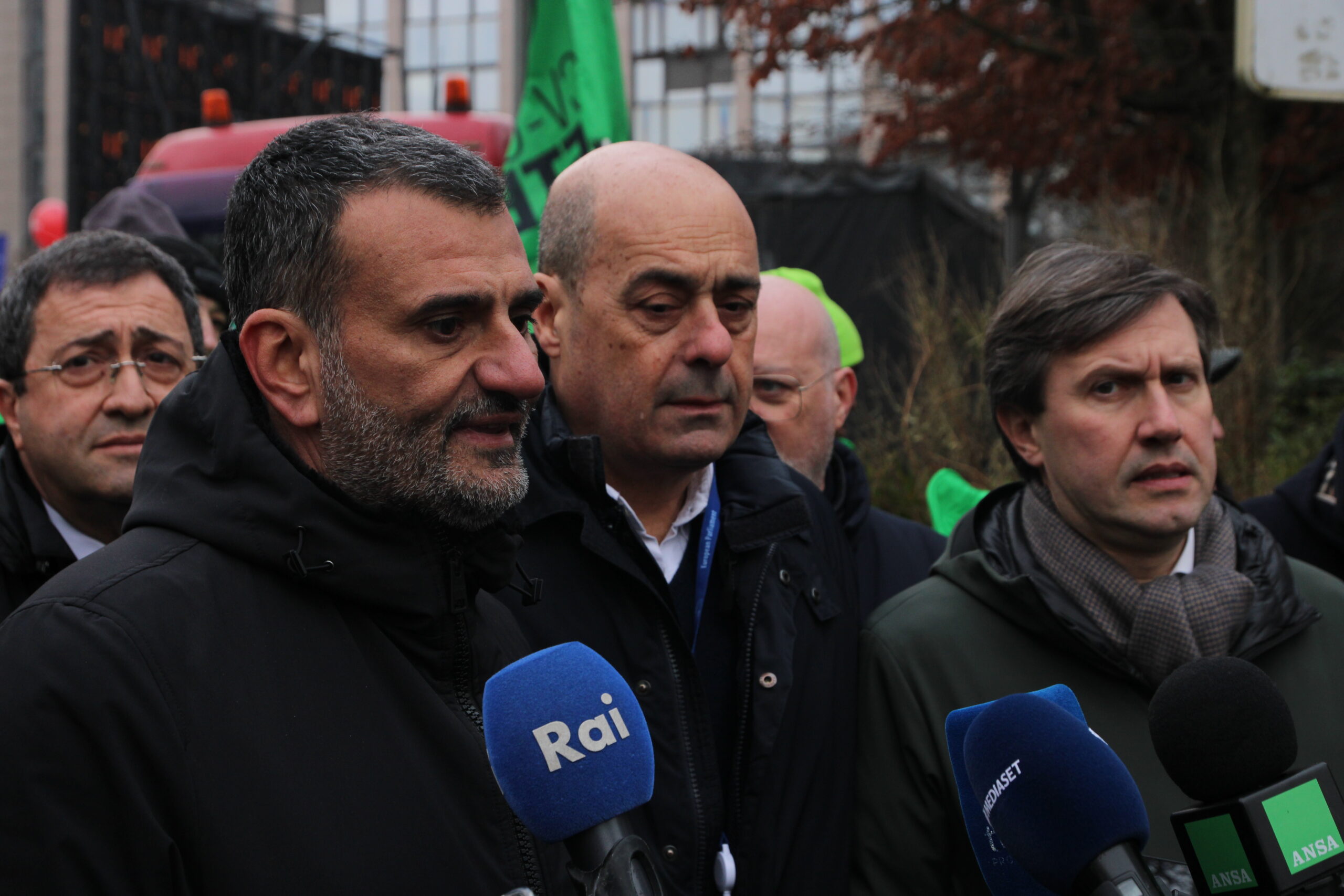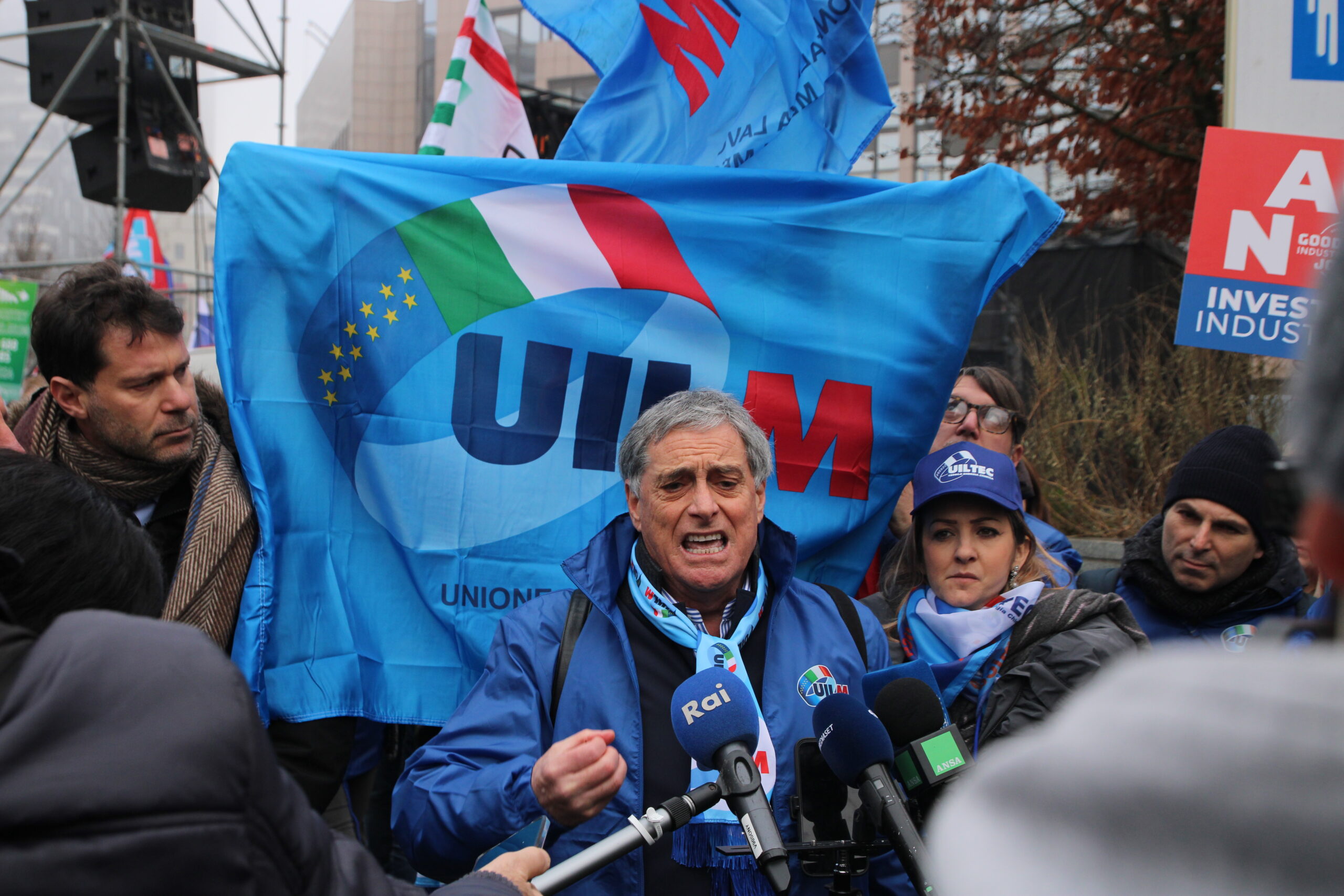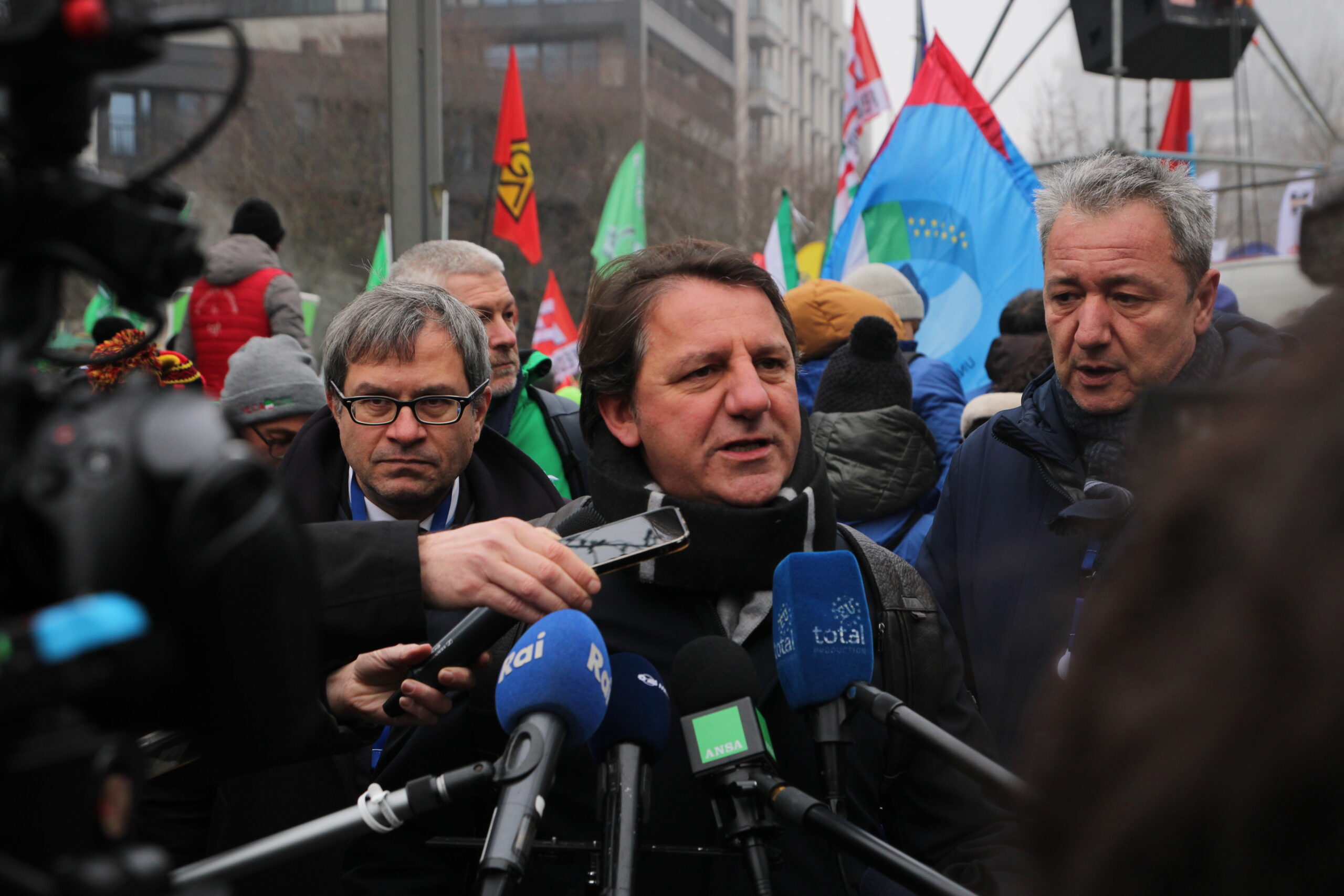Brussels – Three thousand, according to law enforcement officials; at least seven thousand, according to labour unions. Driven by the crisis affecting the automotive industry, thousands of workers from the metal, steel, chemical, pharmaceutical, textile, and energy sectors poured into the European Quarter in Brussels to demand concrete and immediate action from the EU to support workers. The call by IndustriALL – Europe, the European Federation of Industry Unions, was also answered by the Italian patrol formed by FIOM, UILM, FIM, FILCTEM, UILCA AND FEMCA.
An unprecedented “wide field” was also seen in the packed square: Democratic Party, 5 Star Movement, and Green Left Alliance delegations were present alongside the workers and met with union leaders for a discussion on issues to be taken forward in Brussels and Strasbourg. They started with one fact: European industry is on its knees. IndustriALL secretary Judith Kirton-Darling rattled off the data from the stage in Place Jean Rey: “Since 2009, the European steel industry has lost almost 100,000 jobs. Since June, over 90 thousand cuts in automotive have been announced. Layoffs are also piling up in the chemical, textile, and basic materials sectors.” Also siding with the workers are industry associations: Eurofer, the European Steel Association, supported in a statement today’s demonstration and warned, “Without immediate action from the European Union, there will be more plant closures and job losses in the steel industry.”

Opposite, there is Ursula von der Leyen’s promise to transform the overly dogmatic Green Deal of the last legislature into a Clean Industrial Deal, in which the reasons of industry dictate the timing of the green transition and no longer the other way around. “There is a huge game being played,” said the Democratic Party’s head of delegation to the EU Parliament, Nicola Zingaretti, because while the EU cannot give up on a “necessary transition,” this “cannot always be paid for by the last ones, i.e., the consumers or worse, the labour forces.” For his counterpart from the 5 Star Movement, Pasquale Tridico, the signs are not promising: the Compass for Competitiveness presented last week by the European Commission “is just fluff, to give useless answers.” According to the 5 Star delegation leader, “it is not with simplification, with unbureaucratization, that we solve a problem as dramatic as industry.”

UILM secretary Rocco Palombella at the demonstration in Brussels, 5/02/25 [Ph Simone De La Feld]
The issue is complex; the demands in the square are many, but with a common denominator: “We are in favour of the transition; we are all ecologists, but this transition must not be made to our detriment, we cannot pay the price,” is the main message coming from Italian trade union representatives. Michele De Palma, FIOM-CGIL general secretary, points the finger at Europe, where “nationalism, corporatism and corporativism of companies” are growing and whose struggles and divisions impact workers. “The transition can only be made with the workers,” De Palma growled, “so we need to stop layoffs in Europe, guarantee employment, make the investments that redistribute in terms of wages and reduced hours for people’s lives.
His FILCTEM colleague, Marco Falcinelli, sounded the alarm on the cost of energy, an issue that “particularly concerns Italy,” Europe’s second-largest manufacturing country with a “highly energy-intensive” industry. According to Daniela Piras, general secretary of UILTEC, “the famous energy transition must take place by guaranteeing energy neutrality,” while Rocco Palombella, general secretary of UILM, warned, “We can’t go on this way, either they understand it, or we will make them understand it. We are in favour of transition, but it cannot happen in spite of welfare and by incentivizing poverty.”

In the afternoon, unions met with a delegation of M5S, PD and AVS MEPs in Brussels. The focus, especially on the part of the MEPs, was on the automotive crisis, the one most in the spotlight, on which the European Commission has opened a strategic dialogue with the industry to accommodate its most urgent demands. Tridico relaunched the commitment to push for “a Sure fund for automotive” because “just as it was during the COVID crisis, the automotive crisis is a European crisis.” Antonio Decaro, MEP for the PD, focused on the issue of fines for companies that exceed CO2 emission limits: “We are calling for solutions to avoid hitting European companies that are currently experiencing a difficult situation,” Decaro explained, speculating that to “save” the sector one could “reinvest the penalties in the same companies through technological innovation with the commitment, however, not to relocate jobs.”
Meanwhile, a delegation from IndustriAll and major European trade unions met with the European Commission’s Executive Vice President in charge of Industry, Stéphane Séjourné, and the European Commissioner for Social Rights and Labor, Roxana Mînzatu. On the sidelines of the confrontation, Séjourné reassured, “The Future Clean Industrial Deal is first and foremost a social pact. It has one goal: to keep jobs in Europe.” The date is Feb. 26, the day the Commission will unveil its new industrial pact: for IndustriALL’s secretary, it will have to be the child of an “agreement between workers, industry, and national governments” and based“on investment in the right transition, with secure rights to employment security and training.”
English version by the Translation Service of WithubThe future Clean Industrial Deal is first and foremost a social deal.
It has one objective: keep jobs in Europe
With @RoxanaMinzatu, happy to have exchanged with the @industriAll_EU unions on the sidelines of their demonstration today. pic.twitter.com/0dztz6idNC
– Stéphane Séjourné (@steph_sejourne) February 5, 2025









![Nicola Procaccini, co-presidente del gruppo Ecr [Strasburgo, 11 febbraio 2025. Foto: ]](https://www.eunews.it/wp-content/uploads/2025/02/procaccini-120x86.png)